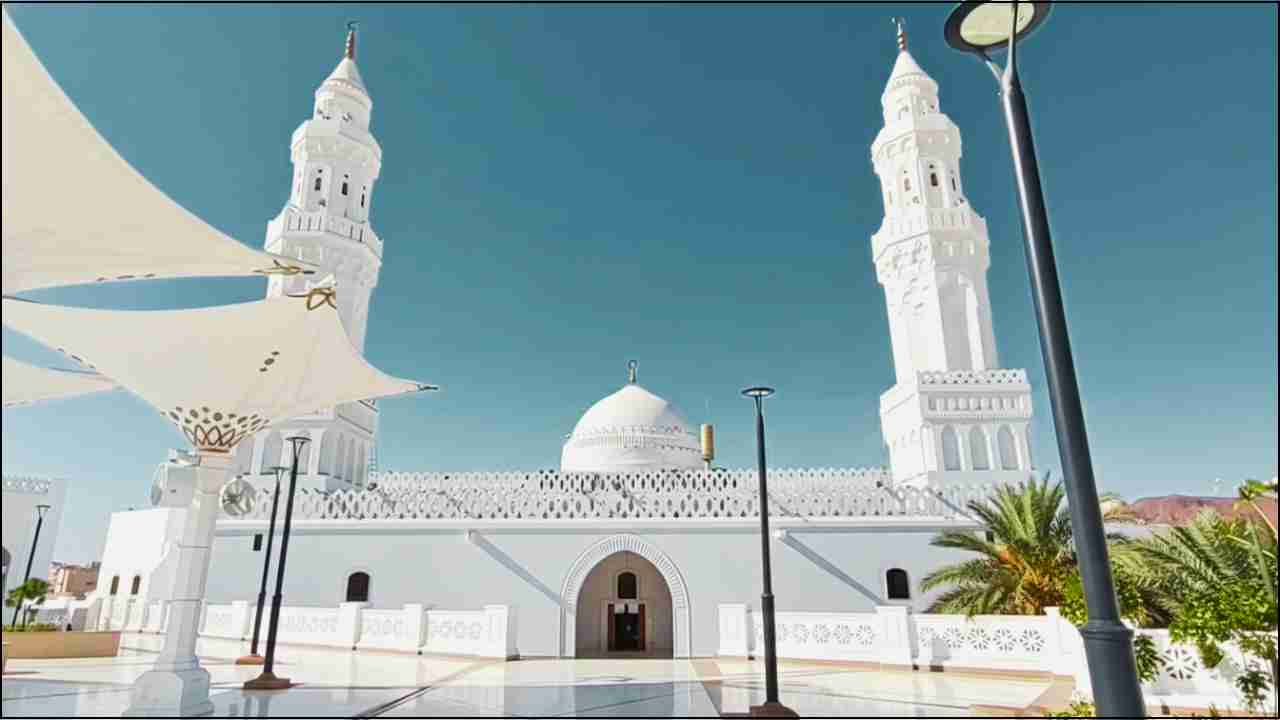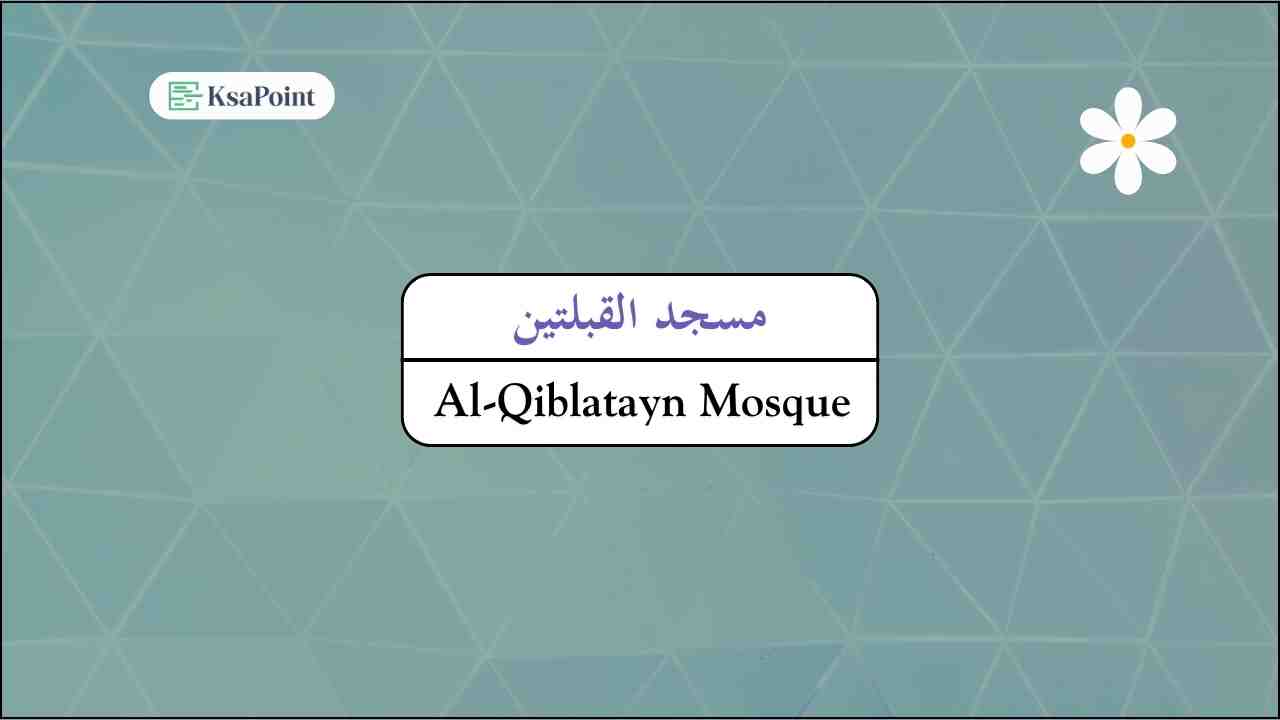Introduction
Al-Qiblatayn Mosque is special place in Islamic history. It is located in Al-Madinah Al-Munawwarah Saudi Arabia. The name Al-Qiblatayn means “the mosque of two Qiblahs.” This mosque is famous because it is place where Prophet Muhammad (PBUH) received order from Allah to change the direction of prayer.
In this article you will learn about the history, location and importance of Al-Qiblatayn Mosque.
📋 Quick Facts About Al-Qiblatayn Mosque
| Detail | Information |
|---|---|
| Name | Al-Qiblatayn Mosque (Masjid Al-Qiblatayn) |
| Meaning | The Mosque of Two Qiblahs |
| Location | Khalid Bin Al-Walid Road, Medina, Saudi Arabia |
| Distance from Prophet’s Mosque | 4 kilometers (10 minutes by car) |
| Built | 2nd year of Hijrah (623-624 CE) |
| Current Capacity | 6,260 worshipers |
| Total Area | 7,500 square meters |
| Historical Event | Change of Qiblah from Jerusalem to Makkah |
| Entry Fee | Free for all Muslim visitors |
What Makes Al-Qiblatayn Mosque Special
Al-Qiblatayn Mosque is important in Islam because of one major event: the change of Qiblah.
The Story of Changing the Qiblah
In second year of Hijrah (after Prophet Muhammad moved to Medina). Muslims used to pray facing Bayt Al-Maqdis (Jerusalem). But Prophet Muhammad (PBUH) wished to pray facing the Kaaba in Makkah.
One day the Prophet (PBUH) was visiting Umm Bishr from Banu Salama tribe to offer his condolences. While he was leading the Dhuhr (afternoon) prayer, Angel Jibreel (Gabriel) came with revelation from Allah. The revelation told the Prophet to change direction of prayer from Jerusalem to Kaaba in Makkah.
Allah says in Holy Quran:
“We have certainly seen the turning of your face toward the sky, and We will surely turn you to a Qiblah with which you will be pleased. So turn your face toward the Sacred Mosque, and wherever you [believers] may be, turn your faces toward it.” (Surah Al-Baqarah, 2:144)
Right during the prayer. The Prophet (PBUH) and worshipers turned to face the Kaaba. This is why mosque is called “Al-Qiblatayn” . The mosque where Muslims prayed in two directions.
🕌 Key Features of Al-Qiblatayn Mosque
Main Features:
- ✅ Built during Prophet Muhammad’s (PBUH) time
- ✅ Location where the Qiblah changed
- ✅ Mentioned in Holy Quran (Surah Al-Baqarah 2:144)
- ✅ Originally had two mihrabs (prayer niches) facing different directions
- ✅ One of the most important historical mosques in Medina
History and Construction of Al-Qiblatayn Mosque
First Building
The first construction of Al-Qiblatayn Mosque was done during the time of Prophet Muhammad (PBUH) in second year of Hijrah. The mosque was built by Banu Suwad Bin Ghannam Bin Ka’b tribe.
The building materials were simple:
- Palm tree trunks
- Palm tree fronds (leaves)
This was normal way to build mosques during that time.
Original Design
The mosque had unique design because of its history:
- Inner section: Had a mihrab (prayer niche) facing the Kaaba in Makkah
- Outer section: Had a mihrab facing toward Al-Sham (Jerusalem area)
Both sections were made from lime and carved stones.

Where is Al-Qiblatayn Mosque Located
Al-Qiblatayn Mosque is located in Al-Madinah Al-Munawwarah (Medina) Saudi Arabia.
Exact Location Details:
- Address: Khalid Bin Al-Walid Road
- Distance from Prophet’s Mosque: About 4 kilometers (approximately 10 minutes by car)
- Original site: Built on an elevated hilltop of Harrat Al-Wabrah
- View: The mosque overlooks part of Wadi Al-Aqeeq in Medina
The mosque is easy to reach for visitors and pilgrims who come to Medina.
Renovations and Expansions Through History
Al-Qiblatayn Mosque has been renovated many times to keep it in good condition and to serve more worshipers.
Major Renovations Timeline:
1. Year 706 CE (Umayyad Period)
- Renovation by Umar Bin Abdulaziz
- He restored many mosques where the Prophet (PBUH) had prayed
2. Year 1488 CE (Mamluk Period)
- After 800 years without major work. Shahin Al-Jamali renovated the mosque
- This started a new period of care and expansion
3. Year 1931 (Saudi Era – King Abdulaziz)
- Complete reconstruction of the mosque
- Building of a surrounding wall
- Construction of a minaret (tower for call to prayer)
- Expansion of area to 425 square meters
4. Year 1987 (King Fahd Era)
- Major rebuilding and expansion
- Mosque area increased to 3,920 square meters
- Modern facilities added
5. King Abdullah and King Salman Era
- Continued repairs and restorations
- Regular maintenance and improvements
- Focus on preserving historical value
Al-Qiblatayn Cultural Center Project
The latest development of Al-Qiblatayn Mosque is part of Al-Qiblatayn Cultural Center project.
Project Management:
- Supervised by Al-Madinah Region Development Authority
Project Details:
- Total area: 7,500 square meters
- Capacity: The mosque can now hold 6,260 worshipers
- New courtyards: Beautiful open spaces for worshipers
- Road networks: Better traffic flow around the mosque
- Parking spaces: Convenient parking for visitors
This project makes it easier for visitors to come and pray at this historic mosque.
📊 Mosque Expansion Through the Years
| Year | Ruler/Period | Mosque Area | Key Improvements |
|---|---|---|---|
| 623-624 CE | Prophet Muhammad (PBUH) | Small structure | Original building with palm trunks |
| 706 CE | Umar Bin Abdulaziz | Restored | Renovation and restoration |
| 1488 CE | Shahin Al-Jamali | Expanded | After 800 years of no major work |
| 1931 | King Abdulaziz | 425 m² | Wall, minaret, complete reconstruction |
| 1987 | King Fahd | 3,920 m² | Major expansion and modernization |
| 2020s | King Salman Era | 7,500 m² | Cultural Center project |
📈 Growth Summary:
From a simple palm structure to a modern 7,500 m² complex that holds 6,260 worshipers.
Why Should You Visit Al-Qiblatayn Mosque
Religious Importance:
- It is where the Qiblah was changed
- Prophet Muhammad (PBUH) prayed here
- It is mentioned in Islamic history books
Educational Value:
- Learn about early Islamic history
- Understand importance of following Allah’s commands
- See how mosques were built in the time of the Prophet
Spiritual Experience:
- Pray in mosque with great Islamic significance
- Feel connected to time of Prophet Muhammad (PBUH)
- Visit a place mentioned in Quran
How to Visit Al-Qiblatayn Mosque
Best Time to Visit:
- Any time during the year
- Avoid very hot summer afternoons
- Prayer times are especially meaningful
Tips for Visitors:
- Dress modestly and respectfully
- Remove shoes before entering
- Women should cover their heads
- Be quiet and respectful inside the mosque
- You can take photos but avoid during prayer times
- Bring water, especially in summer
Getting There:
- Take a taxi or ride from your hotel in Medina
- Tell driver “Masjid Al-Qiblatayn”
- It is only 4 km from Prophet’s Mosque
- Many tour groups include this mosque in their Medina tours
Frequently Asked Questions About Al-Qiblatayn Mosque
What does “Al-Qiblatayn” mean
It means “the mosque of two Qiblahs” because Muslims prayed in two directions here.
Can non-Muslims visit Al-Qiblatayn Mosque
Non-Muslims are not allowed to enter Medina city. This rule applies to all of Medina’s mosques.
Is there an entry fee
No the mosque is free to visit for all Muslims.
How long does a visit take
Usually 20-30 minutes is enough to see mosque and pray.
Is the mosque open all day
Yes but it is most active during the five daily prayer times.
Can women visit the mosque
Yes. Women are welcome to visit and pray at Al-Qiblatayn Mosque.
Conclusion
Al-Qiblatayn Mosque is not just a building. It is living piece of Islamic history. When you visit this mosque. You stand in same place where Prophet Muhammad (PBUH) received the command to change Qiblah. This mosque reminds us of importance of following Allah’s guidance and the beautiful history of Islam in Medina.
If you are planning to visit Medina. Make sure to include Al-Qiblatayn Mosque in your itinerary. It is spiritual and educational experience you will never forget.
May Allah accept all our prayers and visits to the holy places.
Stay updated
Follow us for more guides:
✅ WhatsApp Channel
☑️ Telegram Channel
Related Articles:
- Badiah Palace Mosque: A Complete Guide
- Al-Qantara Mosque Taif: A Complete Guide
- 20+ Best Ziyarat places in Makkah

